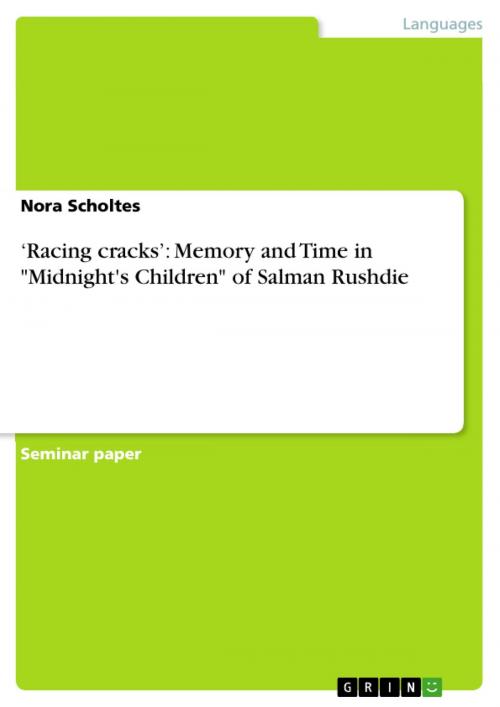'Racing cracks': Memory and Time in 'Midnight's Children' of Salman Rushdie
Fiction & Literature, Literary Theory & Criticism, British| Author: | Nora Scholtes | ISBN: | 9783640345908 |
| Publisher: | GRIN Verlag | Publication: | June 12, 2009 |
| Imprint: | GRIN Verlag | Language: | English |
| Author: | Nora Scholtes |
| ISBN: | 9783640345908 |
| Publisher: | GRIN Verlag |
| Publication: | June 12, 2009 |
| Imprint: | GRIN Verlag |
| Language: | English |
Seminar paper from the year 2008 in the subject English - Literature, Works, grade: 1, University of Kent, language: English, abstract: The 'inexorable ticktock': as soon as Saleem's narration starts, the countdown is set off and will not come to an end until the final full stop of Midnight's Children (MC 82). Throughout the story, Saleem, being a 'child of ticktock', is remorselessly rushed on (MC 533). Towards what, one might ask. His childhood memory of a 'fisherman's pointing finger', on a picture hanging on his bedroom wall, haunts Saleem throughout his narration as a reminder of his 'inescapable destiny' (MC 167). More precisely, the fisherman is pointing towards a letter send by India's first Prime Minister on the occasion of Saleem's birth which coincided with the birth of India as an independent nation. With this letter, Nehru proclaims that Saleem's life will be the 'mirror' of the life of all Indians (MC 167). From his birth, Saleem thus carries the burden of being a reflection of his country and its people. With this enormous responsibility imposed on him, he is pushed on through his narrative. Literally, Saleem is racing against increasingly destructive cracks that threaten to destroy his body. On a metaphorical level, he is fighting against a force beyond his power, a force that ultimately, is going to win: time. Saleem's narrative is drenched with a sense of fatalism, of it being 'too late'. The race is already lost, but at least he must resist his defeat as long as he can, that is, until he has brought his narrative to an end. And all the way through, we hear the threatening tick tock, always aware that the final point zero is approaching fast and could surprise us, along with Saleem, at any moment. Interestingly however, where conventional story tellers build their narratives up towards one big countdown, one decisive climax, Saleem provides us with numerous countdowns. The first one leading up to Saleem's birth, coinciding with India's independence and partition, followed by a countdown leading up to Saleem's amnesia. The birth of his son and his final annihilation constitute the two last countdowns. However, these countdowns do not grant his narrative any disclosure or release, but they seem to be endlessly renewed. Once a countdown is up, a new one begins; each promising a final purpose and meaning, but each time leaving us unsatisfied.
Seminar paper from the year 2008 in the subject English - Literature, Works, grade: 1, University of Kent, language: English, abstract: The 'inexorable ticktock': as soon as Saleem's narration starts, the countdown is set off and will not come to an end until the final full stop of Midnight's Children (MC 82). Throughout the story, Saleem, being a 'child of ticktock', is remorselessly rushed on (MC 533). Towards what, one might ask. His childhood memory of a 'fisherman's pointing finger', on a picture hanging on his bedroom wall, haunts Saleem throughout his narration as a reminder of his 'inescapable destiny' (MC 167). More precisely, the fisherman is pointing towards a letter send by India's first Prime Minister on the occasion of Saleem's birth which coincided with the birth of India as an independent nation. With this letter, Nehru proclaims that Saleem's life will be the 'mirror' of the life of all Indians (MC 167). From his birth, Saleem thus carries the burden of being a reflection of his country and its people. With this enormous responsibility imposed on him, he is pushed on through his narrative. Literally, Saleem is racing against increasingly destructive cracks that threaten to destroy his body. On a metaphorical level, he is fighting against a force beyond his power, a force that ultimately, is going to win: time. Saleem's narrative is drenched with a sense of fatalism, of it being 'too late'. The race is already lost, but at least he must resist his defeat as long as he can, that is, until he has brought his narrative to an end. And all the way through, we hear the threatening tick tock, always aware that the final point zero is approaching fast and could surprise us, along with Saleem, at any moment. Interestingly however, where conventional story tellers build their narratives up towards one big countdown, one decisive climax, Saleem provides us with numerous countdowns. The first one leading up to Saleem's birth, coinciding with India's independence and partition, followed by a countdown leading up to Saleem's amnesia. The birth of his son and his final annihilation constitute the two last countdowns. However, these countdowns do not grant his narrative any disclosure or release, but they seem to be endlessly renewed. Once a countdown is up, a new one begins; each promising a final purpose and meaning, but each time leaving us unsatisfied.















